Meet The New NAFTA, Pretty Much The Same As The Old NAFTA
Thanks to a last-minute agreement, the United States and Canada reached an agreement for a revised version of NAFTA. It's a got a new name, but it's basically NAFTA 2.0.
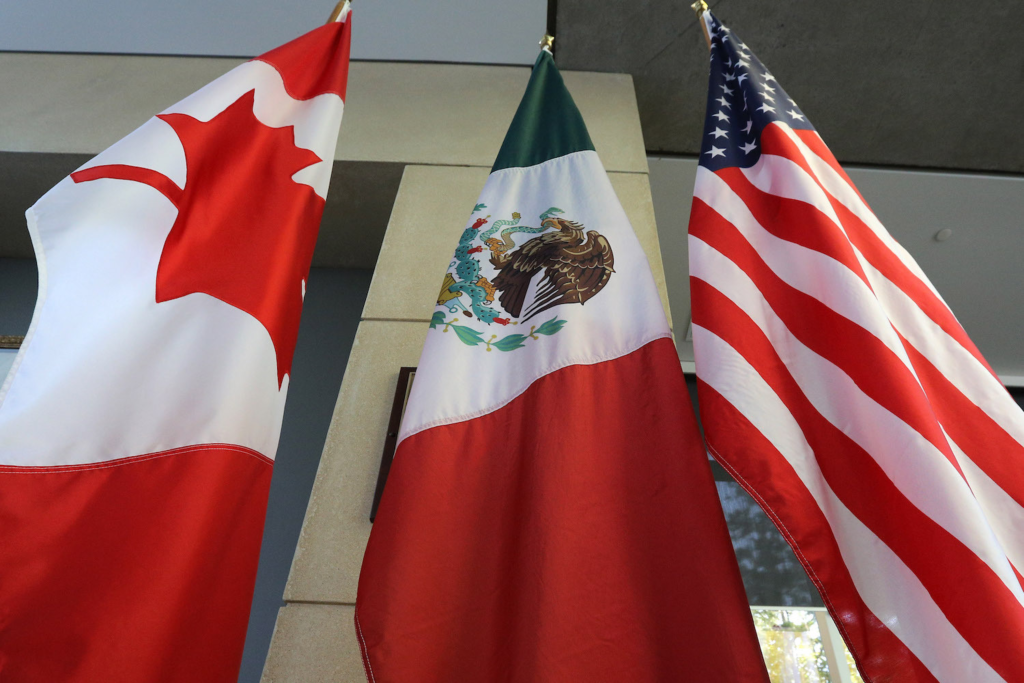
Late yesterday, the United States and Canada reached an agreement on trade that effectively saves the North American Free Trade Agreement from what seemed like its impending collapse:
WASHINGTON — The United States and Canada reached a last-minute deal to salvage the North American Free Trade Agreement on Sunday, overcoming deep divisions to keep the 25-year-old trilateral pact intact.
The deal came after a weekend of frantic talks to try and preserve a trade agreement that has stitched together the economies of Mexico, Canada and the United States but that was on the verge of collapsing. After more than a year of tense talks and strained relations between President Trump and Prime Minister Justin Trudeau of Canada, negotiators from both sides came to a resolution just ahead of a midnight deadline set by the White House.
The 11th-hour agreement was punctuated by a frenetic Sunday, with Canada’s leaders teleconferencing throughout the day with top American officials in Washington. Mr. Trudeau convened a 10 p.m. cabinet meeting in Ottawa to brief officials on the deal, as Jared Kushner, one of Mr. Trump’s closest advisers, and Robert E. Lighthizer, the president’s top trade negotiator, hashed out the final details. Mexico’s under secretary of foreign trade, Juan Carlos Baker, was expected to present the texts of the agreement to the Mexican senate just before midnight.
In a joint statement, Mr. Lighthizer and Canada’s foreign affairs minister, Chrystia Freeland, said the new deal “will give our workers, farmers, ranchers and businesses a high-standard trade agreement that will result in freer markets, fairer trade and robust economic growth in our region.”
The trilateral deal will no longer be called Nafta, they said, but will be named the “United States-Mexico-Canada Agreement.”
The deal represents a win for President Trump, who has derided Nafta for years and threatened to pull the United States from the pact if it was not rewritten in America’s favor. Overhauling trade deals has been one of Mr. Trump’s top priorities as president and he has used tariffs and other threats to try and force trading partners to rewrite agreements in America’s favor.
(…)
The Trump administration struck a deal with Mexico last month to rewrite Nafta and had threatened to jettison Canada from the pact if it did not agree to concessions like opening its dairy market to United States farmers. The White House had set a Sept. 30 deadline to release the text of its new trade agreement with Mexico.
As part of the deal, Canada will ease protections on its dairy market and provide access that is greater than what the United States would have gained through the Trans-Pacific Partnership, a trade treaty that Mr. Trump withdrew from last year.
The United States also relented on its demands to eliminate an independent tariff dispute settlement system that Canada has said is a red line in negotiations. Keeping that was a major concession for the United States and a change for what was agreed with Mexico.
The countries also reached an understanding that would protect Canada from the automobile tariffs that Mr. Trump has routinely threatened, though it is not clear how far those protections would extend. A senior administration official said that if those tariffs were imposed on global imports, Canada and Mexico would receive “accommodations” for their existing car production.
But in a sign of how fraught trade relations remain, Canada did not win assurances that Mr. Trump would lift the steel and aluminum tariffs he imposed earlier this year. Administration officials said that no changes had been made and that those levies are being addressed on a different track.
The agreement builds upon the deal that was reached with Mexico in August. That made updates to provisions surrounding the digital economy, agriculture and labor unions. Most importantly it made alterations to rules governing automobile manufacturing, in an effort to bring more car production back to the United States from Mexico.
“It’s a good day for Canada,” Mr. Trudeau said late Sunday, after convening a meeting with his cabinet. He said he would deliver more details about the agreement on Monday.
After months of sputtering talks, momentum picked up this weekend as Mr. Trudeau inserted himself and made clear that he wanted to get something done. Mexico has also scrambled to try and ensure that the Nafta pact remains trilateral.
More from The Washington Post:
Canada agreed late Sunday to join the trade deal that the United States and Mexico reached last month, meeting negotiators’ self-imposed midnight deadline designed to allow the current Mexican president to sign the accord on his final day in office and giving President Trump a big win on trade.
The new treaty, preserving the three-country format of the original North American Free Trade Agreement favored by business groups and congressional Republicans, is expected to be signed by Trump and his Canadian and Mexican counterparts in 60 days, with Congress likely to act on it next year.
Senior administration officials told reporters on a late-night conference call that the deal validated Trump’s approach to trade policy and fulfilled an important campaign promise to overhaul an agreement he had disparaged as one of the worst trade deals ever made.
The new agreement, the officials said, represents a “template for the Trump administration playbook for future trade deals” designed to boost worker earnings and strengthen the American economy.
Administration officials anticipate a fierce political battle to win congressional approval, especially if Democrats regain control of the House of Representatives in November.
“We will enter October with a trilateral North American trade deal,” said Dan Ujczo, a trade lawyer with Dickinson Wright. “This was the least difficult part. The heavy lift is going to be getting a trade deal through the next Congress in 2019 as well as ratification by Mexico’s new Congress and in Canada during a federal election year.”
Securing a replacement for the nearly 25-year-old NAFTA would be a major accomplishment for Trump and his chief trade negotiator, Robert E. Lighthizer. The president, long a NAFTA critic, has complained that the original treaty cost the United States millions of factory jobs and led to persistent U.S. trade deficits with its southern neighbor.
(…)
Officials touted auto industry provisions in the new agreement that they said would return “billions of dollars of production” to the United States, improved access to Canadian dairy markets, and a review every six years that would prevent the new agreement from becoming outdated.
The treaty also addressed e-commerce with new intellectual property protections, including decade-long patents for biologic drugs.
“Everything we’re doing is designed to lead to higher incomes, higher wages, and a higher standard of living for Americans,” said one senior administration official, who insisted upon anonymity to brief reporters.
The deal also includes stronger protections for labor rights, the environment and intellectual property than did Obama-era trade deals, the official said.
Administration officials have insisted that they needed to release the text of the new deal — with both countries or only Mexico — by Sept. 30. That would comply with a congressional notification requirement and allow Mexican President Enrique Peña Nieto to sign the deal on his last day in office, they said.
(…)
The new deal preserves a regional economic unit that enables North American manufacturers, particularly in the auto industry, to compete against global rivals. Canada and Mexico rank first and second among export markets for U.S. companies. Total U.S. trade with the two countries last year topped $1.1 trillion.
A central objective for the new agreement is restoring “North America as a manufacturing powerhouse” by encouraging U.S. companies to use domestic suppliers rather than companies based elsewhere, Navarro said.
The agreement will require that 75 percent of vehicles granted duty-free treatment be made in North America vs. the current 62.5 percent mandate. It will also require greater use of domestic steel and other materials and establish a new requirement for work to be performed by those earning at least $16 an hour, which will benefit the United States and Canada at the expense of Mexico.
Not surprisingly, the President, who will be holding a press conference about this deal later this morning, is touting the new agreement on Twitter:
Late last night, our deadline, we reached a wonderful new Trade Deal with Canada, to be added into the deal already reached with Mexico. The new name will be The United States Mexico Canada Agreement, or USMCA. It is a great deal for all three countries, solves the many……
— Donald J. Trump (@realDonaldTrump) October 1, 2018
….deficiencies and mistakes in NAFTA, greatly opens markets to our Farmers and Manufacturers, reduces Trade Barriers to the U.S. and will bring all three Great Nations together in competition with the rest of the world. The USMCA is a historic transaction!
— Donald J. Trump (@realDonaldTrump) October 1, 2018
Congratulations to Mexico and Canada!
— Donald J. Trump (@realDonaldTrump) October 1, 2018
President Trump has made his disdain for NAFTA well known for some time now. He was an open critic of the agreement, as well as other aspects of the international trade policy of the United States, dating back to long before the time he was a candidate for office or President of the United States. Once he did get on the campaign trail, he attacked the agreement mercilessly as an example of the kind of “bad deals” that he asserted that his predecessors had agreed to that he claimed he would undo and renegotiate. Much as was the case with Ross Perot and other NAFTA critics dating back to before the agreement ever actually went into effect, of course, the President never really cited anything specific about the agreement that he asserted was deficient. His arguments also ignored the numerous benefits that NAFTA has provided to the American economy in general and to specific American industries such as agriculture, automobile and other manufacturing, and other areas of the economy, especially those in many of the states that Trump won in the General Election in 2016. Notwithstanding all of that, the Trump Administration went ahead with trilateral negotiations with Mexico and Canada designed to try to renegotiate NAFTA with the threat that the United States might pull out of the agreement, even though Trump would have needed Congressional authorization to take that step.
This agreement with Canada, of course, comes just about a month after the White House announced a supposed replacement for NAFTA that only included Mexico due to the fact that negotiations with Canada were going far slower than expected. As I noted at the time, the new agreement did not differ very much from the agreement that has been in effect since the 1990s, and the fact that Canada was not included in the agreement made with Mexico made it objectively worse. As it was, though, the Mexican government had clear that the new agreement would have to be submitted no later than October 1st so that it could be approved by the current Mexican government rather than the government that will be established by Andrés Manuel López Obrador, who was elected President back in July and will take office near the end of this year. However, the extent to which this was an actual deadline is unclear given the fact that Obrador has said that he supported the deal that had been negotiated and would not seek to renegotiate the deal when he took office. Instead, it seems clear that the Administration wanted a deal done so that Trump would have an alleged accomplishment to wave around while campaigning for Republicans over the course of the next month. Finally, as I noted above, it’s unlikely that the President could have gotten his Mexico-only version of NAFTA approved by Congress without including Canada in the deal, or that he could have gotten Congressional authorization to fully repudiate NAFA as he was threatening
As even several of NAFTA’s strongest supporters have said in recent years, there is little question that we are probably long past the time when the deal deserves a second look. Much has changed about the size, scope, and nature of the trading relationship between the United States, Canada, and Mexico over the twenty-four years since the deal went into effect in the early years of the Clinton Administration. Many of the issues that were of concern to the respective nations at the time that the agreement was negotiated are no longer applicable, and they have been replaced by other concerns that aren’t completely addressed by the agreement that exists now. This includes concerns such as intellectual property issues as well as other legal concerns that aren’t directly addressed by NAFTA in its original form, as well as external factors such as the rising influence of China. The second issue, of course, could have been addressed had the President not withdrawn the United States from the Trans-Pacific Partnership, but that’s water under the bridge at this point.
As noted, there are some elements of the new agreement that are arguably positive developments. Unlike the original NAFTA, the new agreement includes provisions that open up access to Canada’s dairy markets to the United States, and also give access to American dairy markets to Canada. Depending on the details this could inure to the benefit of American consumers as well as the agricultural industry. Additionally, the new agreement continues to assist in the integration of the American, Mexican, and Canadian automobile manufacturing industry as well as including provisions to cover technology and intellectual property issues not covered by the original agreement simply because the tech industry in the early 90’s was nothing like what it is today. For the most part, though, the new agreement is basically just an updated version of NAFTA with a new name notwithstanding all the Trumpidian flourish that will accompany its introduction.

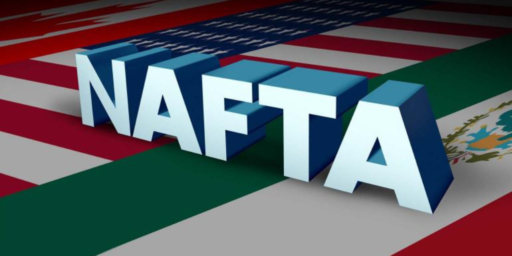
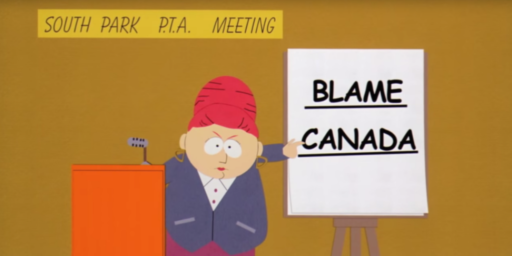
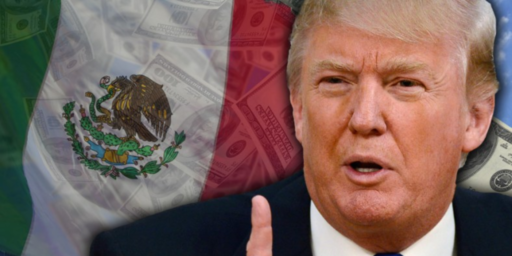
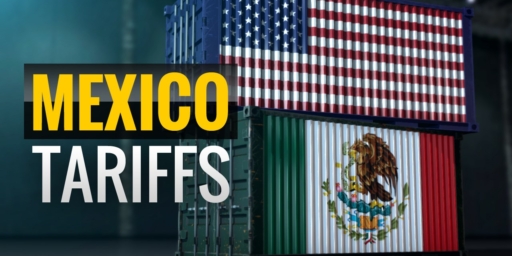
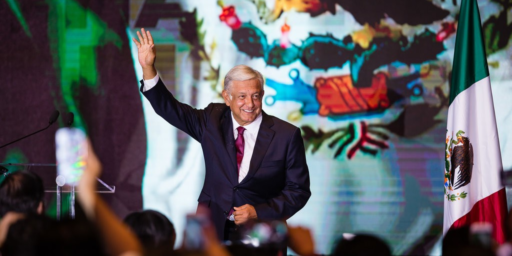
It should be noted that the Canadian “concessions” all appear to be things they had already agreed to during the TPP negotiations.
Once again, Trump creates a crisis, and then “solves” it by going back to the status quo plus or minus 3%.
It’s a good trick, and the Trumpeteers lap it up.
@Gustopher:
Except with NoKo he went back to the staus quo plus he fell in love with Kim.
I do so love a good romantic comedy!!!
Canadian news so far (across the spectrum) are saying its a minor loss for Canada because of dairy, but otherwise a decent deal.
Given that supply side management of dairy is fairly controversial (among the few who pay any attention to that sort of thing) within Canada that probably isn’t a big deal, except the deal might effect the Quebec provincial election being held today – in fact the consensus is the deal was held to the end so as to minimize the effect on that election.
El Cheeto’s M.O. goes like this:
1) Raise impossibly high expectations.
2) Lower the bar so much it rests on the floor
3) Wriggle under the bar
4) Proclaim the impossibly high expectations have been exceeded
5) Tweet angrily at any reasonable criticism
6) Act like a victim
7) Squirrel!!
So the Canucks gave up the same diary protections they were willing to give up in the TPP, and Dennison got nothing in return?
And this is the worlds greatest deal maker?
Still…I bet the sheep are excited. Right Bungie?
This has been Trump’s mo his entire life. Destroy something and then negotiate the same deal, but slap your name on it.
What damn fraud. But the Mbunge crowd will eat this crap up.
@Daryl and his brother Darryl:
As far as I can tell (details are still hard to come by), Canada gave up a couple of minor to meaningless concessions in order to preserve most of the status quo.
So you could count it as a very minor “win” for the US, if you are so inclined.
But the political and reputational price the US has paid has already been exceedingly steep. Successful trade deals are not zero-sum games. And while it is fairly easy for the US to push Canada around (with which other close neighbor are they going to trade?), the country is going to pay for this a couple times over when it comes to dealing with the EU, China, or even Japan.
We spent a lot of time and money and political capital to make cosmetic changes to what Dennison called the worst trade deal in US history.
Does this mean we will get back into the Iran Deal any day now? Just call it something else?
@Daryl and his brother Darryl: Of course a name change is all that’s needed, as long as it begins with United States all is cool.
Dennison has now called the NNAFTA (NewNAFTA) the single greatest agreement of all time.
https://www.washingtonpost.com/business/2018/10/01/us-canada-mexico-just-reached-sweeping-new-nafta-deal-heres-whats-it/?noredirect=on&utm_term=.0a496328dad5
So, Donald Trump spearheads the drive to get a new trade agreement between the U.S., Canada, and Mexico. He achieves that goal. Pretty much everybody admits the new deal is an improvement on NAFTA. And the people who said he couldn’t do it and criticized him every step along the way are proven wrong yet again.
If getting Canada to give in on dairy was so easy, why didn’t President Obama do it?
Mike
@MBunge:
No…sycophants like you do. Most everyone recognizes that it little changed from previous agreements. A few very small things, many offset by other things. E.g. some Mexican workers waages will go up, which might cause a few jobs to stay here, but the same provision will likely accelerate automation like robotics.
Will it cut the $800B trade deficit Dennison talks about? Definitely…because Dennison has been lying; the trade deficit is really around $570B.
So much winning!!!
Trumpies are so easily played!!!
He did…it was in the TPP that Dennison also walked away from. This agreement gets access to slightly more of the market. Just over 1/4% more of the market. So much winning.
Why do you have these strongly held opinions…when you seemingly know nothing of the topics you are talking about?
@MBunge:
Asked and answered: @Daryl and his brother Darryl:
In other words, Obama did.
@Daryl and his brother Darryl:
Oh, that’s easy to answer: Trump said so.
BTW, this “win” lets him fire Rosenstein later this week.
@MBunge: I don’t see where you get that this new thingamajig is an “improvement” due to Trump. It’s a slight update on what we had before, and the stuff that the Canadians “gave up” is stuff that they already said they were willing to axe in the TPP.
But here you are screeching about how this is such an improoovement and how FANTASTIC Trumpy is at getting it done, etc. etc. and so forth….
Tell me, were you one of the marks who was taken in by “Trump University”? You certainly seem so!
I suspect you also believe in the offers in Nigerian spam mail.
Speaking of this sham deal, has anyone seen this? It’s mighty impressive to be both a whiny ass titty baby and a male chauvinist pig in a single press conference…
NAFTA allows a pretty efficient supply chain in North America. In fact, the biggest problem of NAFTA are American agricultural subsidies, not Mexico. Messing with NAFTA is completely stupid.
@MBunge: TPP was 3.25% of the Canadian, you guys a whopping 3.6%
SCORE!
@Daryl and his brother Darryl:
How long do you think it will be before Trump starts using the correct number and praising himself for reducing the trade deficit $230 billion with this new agreement?
@MBunge:
The new deal is NAFTA + TPP, so we could have had this years ago, without the intermediate tax increases.
No one thought Trump could do this, because he’s incredibly uninformed on the subject of international trade. It was only in doubt because of Trump, so congratulating him for doing the bare minimum is dumb.